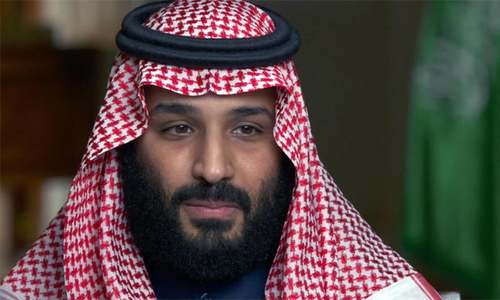The crown prince and de facto leader of Saudi Arabia said Israel has a “right” to a homeland, a notable shift in the kingdom's position, in an interview published in The Atlantic on Monday.
Saudi Arabia and Israel still have no formal diplomatic relations, but behind the scenes, improvements in their ties have accelerated in recent years.
Both countries see Iran as their biggest outside threat and the United States (US) as their key ally, and both see danger from armed extremists.
Israel's conflict with the Palestinians has long proved an obstacle to a full rapprochement, however, as Riyadh still supports their claim to sovereignty.
But now Crown Prince Mohammed bin Salman — speaking to the editor-in-chief of US news magazine The Atlantic — appeared to put the rival land claims on an equal footing.
The prince was asked by Jeffrey Goldberg whether the “Jewish people have a right to a nation-state in at least part of their ancestral homeland?”
“I believe that each people, anywhere, has a right to live in their peaceful nation,” said the prince, who is on a three-week US tour.
“I believe the Palestinians and the Israelis have the right to have their own land,” he added.
“But we have to have a peace agreement to assure the stability for everyone and to have normal relations.”
Since 2002, Saudi Arabia has been the main sponsor of the Arab Peace Initiative, which envisions a two-state solution to the Israeli-Palestinian conflict.
But no such senior Saudi official is known to have previously accepted that Israel has a “right” to any land beyond the practical need to secure a lasting deal.
If, as expected, the crown prince succeeds his octogenarian father King Salman and ascends to the Saudi throne, he will also become guardian of Islam's holiest shrines.
But he told Goldberg he had no “religious objection” to Israelis living alongside Palestinians, so long as the main Muslim holy site in Jerusalem — the Al-Aqsa mosque compound — is protected.
“We have religious concerns about the fate of the holy mosque in Jerusalem and about the rights of the Palestinian people,” he said.
“This is what we have. We don't have any objection against any other people."
'What is Wahhabism?'
When asked about the Wahhabist ideology, the crown prince told Goldberg "This Wahhabism — please define it for us. We’re not familiar with it. We don’t know about it."
"It’s a movement founded by Ibn abd al-Wahhab in the 1700s, very fundamentalist in nature, an austere Salafist-style interpretation...," replied Goldberg, at which point he appeared to have been cut off by the prince.
"No one can define Wahhabism. There is no Wahhabism. We don’t believe we have Wahhabism. We believe we have, in Saudi Arabia, Sunni and Shiite. We believe we have within Sunni Islam four schools of thought, and we have the ulema [the religious authorities] and the Board of Fatwas [which issues religious rulings]. Yes, in Saudi Arabia it’s clear that our laws are coming from Islam and the Quran, but we have the four schools — Hanbali, Hanafi, Shafi’i, Maliki — and they argue about interpretation."
'Triangle of evil'
"A 'triangle of evil' is trying to promote the idea that our duty as Muslims is to reestablish the caliphate, to reestablish the mindset of the caliphate — that the glory of Islam is in building an empire by force," said the prince in a question on Islam.
When asked to elaborate, he said: "First in the triangle, we have the Iranian regime that wants to spread their extremist Shiite ideology. The second part of the triangle is the Muslim Brotherhood, which is another extremist organisation. They want to use the democratic system to rule countries and build shadow caliphates everywhere. The other part is the terrorists — al-Qaeda, ISIS — that want to do everything with force."
"This triangle is promoting an idea that God and Islam are not asking us to promote [...] Saudi Arabia, Egypt, Jordan, Bahrain, Oman, Kuwait, United Arab Emirates, Yemen — all of these countries are defending the idea that independent nations should focus on their own interests, in building good relations on the foundation of UN principles. The evil triangle doesn’t want to do that."
'Absolute monarchy'
"Absolute monarchy is not a threat to any country. You say 'absolute monarchy' like it’s a threat," the prince said in reply to a question. "If it were not for absolute monarchy, you wouldn’t have the United States. The absolute monarch in France helped the creation of the United States by giving it support. Absolute monarchy is not an enemy of the United States. It’s an ally for a very long time."
"Saudi Arabia is a network of thousands of absolute monarchies, and then has a large absolute monarchy. We have tribal monarchies, town monarchies. Moving against this structure would create huge problems in Saudi Arabia. The Saudi fabric is much more complicated than you think. And actually our king doesn’t have absolute power. His power is based in law. If he is making a royal decree, he can’t say, 'I’m King Salman and I’m doing this'. If you read decrees, you first see the list of laws that allow the king to take this decision. By the way, the queen of the United Kingdom, she has absolute power with any law. But she doesn’t practice it. So it’s complicated."














































